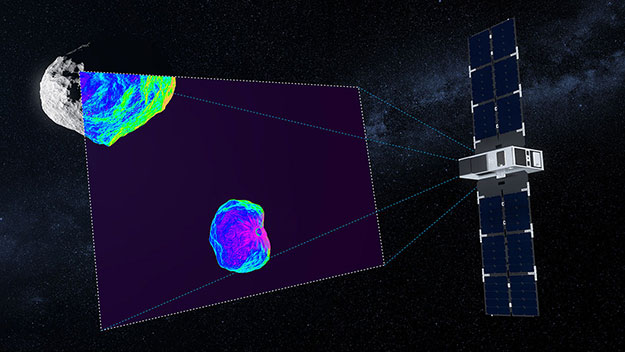As the European Space Agency’s HERA Mission prepares for its journey to the Didymos double asteroid system in 2024, Tyvak’s selected spacecraft, MILANI, has been confirmed as operationally effective.
BOCA RATON, Fla. (August 4, 2021) – MILANI is a 6U satellite specifically created for the European Space Agency by Tyvak International in Torino, together with a consortium of partner companies, universities and research institutes from Italy, Finland and Czech Republic. MILANI was appropriately named after the Italian mathematician and astronomer Andrea Milani, a leading figure in Europe’s space science community, and a pioneer of asteroid risk analysis.
Milani scans Didymos | photo credit: European Space Agency
In a launch scheduled for 2024, MILANI will be carried by the HERA mothercraft and will take 3 years to travel from Low Earth Orbit to the Didymos binary system of asteroids. Expected to reach the asteroids in 2027, MILANI will be deployed to survey the surface with a hyperspectral imager combining visible and near infrared wavelengths to survey the surface of the asteroids. It also will carry an Italian built dust detector capable of detecting tiny dust particles, volatiles and light organic matter, characterizing the molecular composition of the larger asteroid bodies.
“The Preliminary Design Review is one fundamental step towards the definition of the mission and system architecture” – said Fabio Nichele, CEO of Tyvak International – “We are proud to share the successful accomplishment of this important Milestone and we congratulate the ESA and our partners for this great achievement. We look forward to starting Phase C and continuing to enable this Mission with enthusiasm and dedication.”
Milani studies asteroid dust | photo credit: European Space Agency
“We are extremely excited by the advance of the Milani project, on a very fast track to asteroid Didymos. We congratulate the whole team at Tyvak and their international partners for the excellent work and we look very much forward to move into phase C”, adds Ian Carnelli Hera project manager at ESA.
The MILANI mission is being supported by the Italian Space Agency
